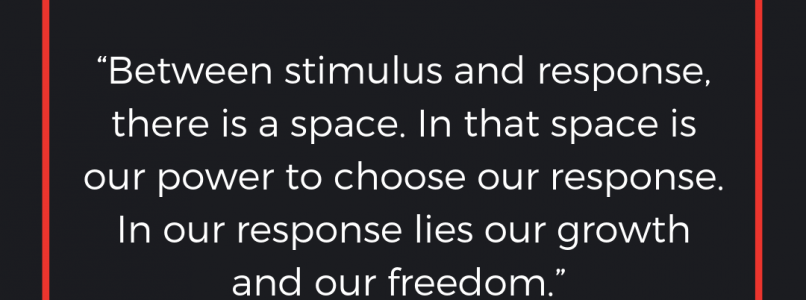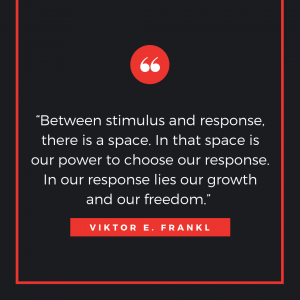 Every parent is made up of a measure of good,
Every parent is made up of a measure of good,
a portion of bad and
occasionally a dollop of ugly.
I don’t care how good a parent you are; this is true. The problem that we run into is focusing on any one part.
Many parents focus on the bad. They forget that there is a large portion of good. Others focus on the good and forget that they need to work on the bad. And occasionally, some see only the dollop of ugly. Each of these scenarios lessens our ability to parent well, long term.
Let me share three personal experiences.
1. I was on occasion, not nurturing. I can recall hearing a child gaging in the night and then pulling them out of bed, running them down the hall, all the while repeating in an urgent voice, “Hold it. Don’t throw up.”
2. My youngest daughter wanted to be a cheerleader. During the try-outs, she had to do a solo routine and fell. It seemed like an eternity until she looked up towards the bleachers where I was, although only seconds had passed. When she looked my way, she saw me standing in a sea of sitting parents. She saw me silently sending the message, I am proud of you. I want everyone to know I am your mom. Get up, you can do this. P.S. She made the squad!
3. We had six kids, were living in Montana, and money was tight. One night I found an open Tampon in the bathroom garbage. A child had been curious, opened it, and it was now no good. I had, on occasion, found myself without that needed necessity. I flipped.
I drug six kids out of bed, lined them up in the hall and went up and down the line shaking the Tampon in their noses, asking repeatedly, “WHO OPENED THIS!”
Story one is bad. A good mom sits on the side of the bed with a pan, soothing a fevered brow and speaking calm and loving words. They aren’t concerned with vomit and cleaning it up. Right?
Story two is so good. I mean, doesn’t it make you want to be that mom?
Story three is ugly, totally out of control.
And there it is. We all have our ugly moments. We all have moments when we shine. And we all have moments when it’s clear that although we aren’t the worst parent on the planet, we surely could be better.
It’s vital to remember that you are not just one part, you are all three. There is no perfection in parenting any more than there is perfection in friendship, relationships, or life.
We need to focus on the good. We need to improve the bad. And we need to forgive ourselves for the occasionally ugly. When we do this, we are better parents. There is power in seeing the good, acknowledging the bad and forgiving the ugly and that power helps us parent better.
Here are a few things I have learned
about kids that make it easier for you to improve and forgive yourself, to worry less and to know that it’s going to be OK in the end.
• Kids love their parents unconditionally
• Kids are quick to forgive
• Kids are resilient
• Kids have a way of moving on
Our goal is not perfection. There is always going to be something you don’t know, haven’t mastered yet or that is messy. In a family, in life, there is always work to do. Keep improving yourself. Do more good, improve the bad and you will lessen the ugly. And in the end, it will all be OK.



 My husband bought a pergola for our patio. It was a necessity because the west sun is so hot that you can’t even turn the doorknob in mid-summer.
My husband bought a pergola for our patio. It was a necessity because the west sun is so hot that you can’t even turn the doorknob in mid-summer. own. Don did one but with a replaced hip he knew he could
own. Don did one but with a replaced hip he knew he could The day I needed to drill into cement and put in long screws and tighten them down I found myself in the same dilemma. But I remembered that pill experience which I had had only a few months earlier.
The day I needed to drill into cement and put in long screws and tighten them down I found myself in the same dilemma. But I remembered that pill experience which I had had only a few months earlier.

 I got a fabulous call recently from a dear friend. She wanted to tell me about her three grandchildren, twins, aged 8 and one, aged 5. They have been playing a game with their grandma when she takes them to school 3 times a week. It’s called, Embellish the Story. One of them begins the story and then they each take a turn adding to it. In other words, they embellish it.
I got a fabulous call recently from a dear friend. She wanted to tell me about her three grandchildren, twins, aged 8 and one, aged 5. They have been playing a game with their grandma when she takes them to school 3 times a week. It’s called, Embellish the Story. One of them begins the story and then they each take a turn adding to it. In other words, they embellish it.
 I love to write but don’t always want to prepare and post a new article every week. I enjoy posting something of value every day on Facebook but sometimes I would rather do other things. However, I do both as perfectly as I can because I have a goal and to reach it, I have learned that there must be consistency in my effort, for as long as it takes.
I love to write but don’t always want to prepare and post a new article every week. I enjoy posting something of value every day on Facebook but sometimes I would rather do other things. However, I do both as perfectly as I can because I have a goal and to reach it, I have learned that there must be consistency in my effort, for as long as it takes. important in parenting because it nearly always takes until a child leaves home and creates their own life to see the results of our efforts. While they’re growing, it’s tempting to let ourselves feel failure because we don’t see our child as neat, quiet, mannerly and so forth. We often see a mud-covered child, a snitched cookie behind a back, spilled milk on the kitchen floor, or we hear voices’ complaining that it’s not their fault or “it’s my turn.”
important in parenting because it nearly always takes until a child leaves home and creates their own life to see the results of our efforts. While they’re growing, it’s tempting to let ourselves feel failure because we don’t see our child as neat, quiet, mannerly and so forth. We often see a mud-covered child, a snitched cookie behind a back, spilled milk on the kitchen floor, or we hear voices’ complaining that it’s not their fault or “it’s my turn.”
 Recently, while at a friend’s home, she talked to me about the challenge of managing all the stuff in her home. Now let me clearly state that her home is clean and orderly. She isn’t having a problem with clutter or mess. But she has accumulated a lot of stuff over the years.
Recently, while at a friend’s home, she talked to me about the challenge of managing all the stuff in her home. Now let me clearly state that her home is clean and orderly. She isn’t having a problem with clutter or mess. But she has accumulated a lot of stuff over the years. Los Angeles families and found all the mothers’ stress hormones spiked during the time they spent dealing with their household paraphernalia (Arnold, et al, Life at Home in the Twenty-First Century).
Los Angeles families and found all the mothers’ stress hormones spiked during the time they spent dealing with their household paraphernalia (Arnold, et al, Life at Home in the Twenty-First Century).



 The idea that we should be careful to keep our priorities right in terms of not letting lesser concerns get in the way of greater ones so that we find ourselves “in the thick of thin things,” is good advice.
The idea that we should be careful to keep our priorities right in terms of not letting lesser concerns get in the way of greater ones so that we find ourselves “in the thick of thin things,” is good advice.




 I bet you clicked this email because the subject line ticked you off! Twenty years ago, it would have ticked me off too. However, I hope to move you in the direction of accepting this as true because it has great bearing on what
I bet you clicked this email because the subject line ticked you off! Twenty years ago, it would have ticked me off too. However, I hope to move you in the direction of accepting this as true because it has great bearing on what

 her she said that she was having tons of visits and treats but that her family could use some nurturing. Hence one apple pie.
her she said that she was having tons of visits and treats but that her family could use some nurturing. Hence one apple pie. Saturday morning our church planned a Christmas breakfast. That’s right, breakfast. I would have opted to take a breakfast casserole, but my husband has a family tradition of Green Chili Pancakes and it’s so unique that he really wanted to share
Saturday morning our church planned a Christmas breakfast. That’s right, breakfast. I would have opted to take a breakfast casserole, but my husband has a family tradition of Green Chili Pancakes and it’s so unique that he really wanted to share  it. The problem is, he doesn’t know how to make it, I do. His grannie taught me. : ) So I needed to make 50 pancakes and then a huge pot of the green chili sauce. It was too much to do Saturday morning, so it had to be done on Friday. This is very delicious by the way.
it. The problem is, he doesn’t know how to make it, I do. His grannie taught me. : ) So I needed to make 50 pancakes and then a huge pot of the green chili sauce. It was too much to do Saturday morning, so it had to be done on Friday. This is very delicious by the way.  Long story. And I also realized that I needed a formatted document to include with a special framed family genealogy chart we are sending to our children. We are direct descendants of William Brewster of the Mayflower and I wanted to help each family understand who he was, what his family was like, and why they came to America.
Long story. And I also realized that I needed a formatted document to include with a special framed family genealogy chart we are sending to our children. We are direct descendants of William Brewster of the Mayflower and I wanted to help each family understand who he was, what his family was like, and why they came to America. It’s Saturday morning now. The church breakfast is done. The chili pancakes were a success. Everyone loved the pies which have been eaten and I am heading off to do the tent kit and get the rest of the stuff wrapped and shipped. My house is a disaster and the kitchen cabinets can’t even be seen. I haven’t vacuumed, dusted, or cleaned anything. Laundry is piling up but I did get one load in before the breakfast. Another big woohoo!
It’s Saturday morning now. The church breakfast is done. The chili pancakes were a success. Everyone loved the pies which have been eaten and I am heading off to do the tent kit and get the rest of the stuff wrapped and shipped. My house is a disaster and the kitchen cabinets can’t even be seen. I haven’t vacuumed, dusted, or cleaned anything. Laundry is piling up but I did get one load in before the breakfast. Another big woohoo!